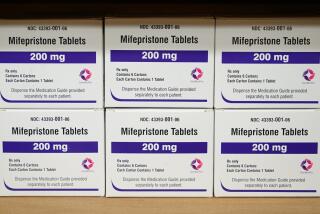CVS’ halt on tobacco wins praise
CVS Caremark Corp.’s imminent exit from the cigarette and tobacco business — an unprecedented move for a major pharmacy company — is being cheered by many medical professionals and lawmakers as a triumph of corporate responsibility over the bottom line.
But industry experts say the strategy shift is less an altruistic endeavor than a savvy marketing ploy from a drugstore giant trying to promote itself as a retail health hub in an age of increasingly self-serve healthcare.
“It’s smart business on CVS’ part,” said Carl Tobias, a law professor at the University of Richmond in Virginia, a state steeped in tobacco history.
The drugstore chain — the largest in the country by sales with $123 billion in revenue in 2012 — said Wednesday that it will be tobacco free by Oct. 1. CVS has more than 7,600 stores, making it second in retail locations only to Walgreens.
The move comes soon after the 50th anniversary of a landmark report from the surgeon general linking smoking to illnesses such as lung cancer and heart disease. Pharmacies have faced years of criticism from health advocates for juxtaposing tobacco items with medical products.
Former smoker President Obama applauded CVS, saying the company “sets a powerful example” and that its decision “will have a profoundly positive impact on the health of our country.” He added that the strategy shift will aid his administration’s efforts to reduce tobacco-related deaths and illnesses while also bringing down healthcare costs.
CVS said that it is sacrificing $2 billion in annual revenue in its endeavor, which it said also includes a “robust national smoking cessation program” to begin this spring. But the Woonsocket, R.I., chain also has much to gain.
Amid a shortage of primary care doctors and legislation that expands access to healthcare coverage, CVS and many of its competitors are investing in more in-store urgent care clinics. They’re also featuring pharmacists who can offer medical counseling and extending outreach efforts to clinicians and medical centers.
More Americans are seeking self-service options at local retailers providing a growing suite of services and products made cheaper and simpler by improving technology, said Columbia Business School professor Rita McGrath.
“In today’s fast-moving, competitive market, retailers are taking their resources from declining categories like cigarettes, where there’s a lot of cost associated with securing the products and checking people’s ages, and putting them into growth areas that involve health and services,” she said.
Retail establishments such as CVS, Walgreens and Rite Aid operate more than 1,600 health centers, according to an article Wednesday in the Journal of the American Medical Assn. The piece was written by Dr. Troyen A. Brennan, CVS’s chief medical officer, and Dr. Steven A. Schroeder, who runs the Smoking Cessation Leadership Center at UC San Francisco.
“Making cigarettes available in pharmacies in essence ‘renormalizes’ the product by sending the subtle message that it cannot be all that unhealthy if it is available for purchase where medicines are sold,” they wrote.
Investors were uncertain, sending CVS Caremark’s stock down 1%, or 67 cents, to $65.44 a share Wednesday. Meanwhile, Walgreen Co. rose 3.4%, or $1.90, to $57.85, and Rite Aid Corp. increased 2%, or 11 cents, to $5.45.
But by renouncing cigarettes, CVS could end up engendering loyalty among customers, some experts said.
Elena Maa, a Los Feliz mother of four, said she’ll patronize the chain even more now that cigarettes are on their way out.
“Smoking isn’t good for us or the kids,” said Maa, who was shopping at an East Hollywood CVS with her 3-year-old son, Jake. Maa, 44, said Jake’s mild asthma is exacerbated by secondhand smoke.
In 2008, San Francisco banned tobacco products in pharmacies, becoming the first U.S. city to do so. Boston and Needham, Mass., followed the next year with similar laws. Less than 5% of cigarette revenue came from pharmacies in 2009, according to the Center for Global Tobacco Control.
Walgreens resisted the San Francisco ban and issued an alert arguing that removing cigarettes from drugstores would “force smokers to liquor stores, tobacco shops, gas stations and other retailers that don’t carry smoking cessation products and don’t have pharmacists available for advice on quitting.”
On Wednesday, Walgreens spokesman Michael Polzin said the company would “continue to evaluate the choice of products our customers want, while also helping to educate them and providing smoking cessation products and alternatives that help to reduce the demand for tobacco products.”
Walgreens said it is working with GlaxoSmithKline Consumer Healthcare to run a free online program called Sponsorship to Quit, targeting smokers who want to stop.
Rite Aid, in a statement, said that in addition to its tobacco products, it sells items to help smokers quit and offers pharmacists to counsel customers trying to go cold turkey.
Wal-Mart declined to comment.
For cigarette companies already struggling with declining demand, increased regulation and hostility from the medical field, the loss of a major U.S. retailer will burn.
The American Medical Assn., which in 2009 publicly opposed the presence of tobacco products in pharmacies, said Wednesday that CVS would help curb tobacco use by limiting customers’ access to it and “will spur other pharmacies to follow suit.”
In 1965, 42% of adults were smokers, according to the Centers for Disease Control and Prevention. Now, only 18% of adults light up.
Between 2008 and 2013, the $93.1 billion U.S. wholesale market for cigarettes and tobacco products suffered a 2.4% annual sales slump, according to research from IBISWorld. Revenue is projected to decline 1.6% in each of the next four years.
Cigarette companies such as Altria Group Inc. have tried to compensate by searching for customers overseas and by steadily raising prices. But the business, which owns Marlboro and holds more than a quarter of cigarette market share, said revenue from its smokeable products segment decreased 3.2% in the fourth quarter.
Altria, which did not return a request for comment, saw its stock slip 1.3%, or 43 cents, to $34 a share Wednesday. Reynolds American Inc., the second-largest tobacco company in the country and parent to cigarette brands such as Camel and Pall Mall, dipped 0.7%, or 36 cents, to $47.14 a share.
“We value the long-term relationship we had with CVS and respect their commercial decision,” Reynolds spokeswoman Jane Seccombe said. But many smokers are defiant, saying that what CVS won’t offer they’ll just find somewhere else.
Thomas Franklin, 35, is a pack-a-day smoker who said he buys cigarettes at a CVS near his West Hollywood home because they’re cheaper there. Franklin said he would stock up before the products disappear from the chain.
He said CVS was picking and choosing vices to block from shoppers.
“They shouldn’t sell candy because it’s bad for your health,” Franklin said, “or alcohol, for that matter.”
soumya.karlamangla@latimes.com
Twitter: @tiffhsulatimes @NoamLevey @skarlamangla









